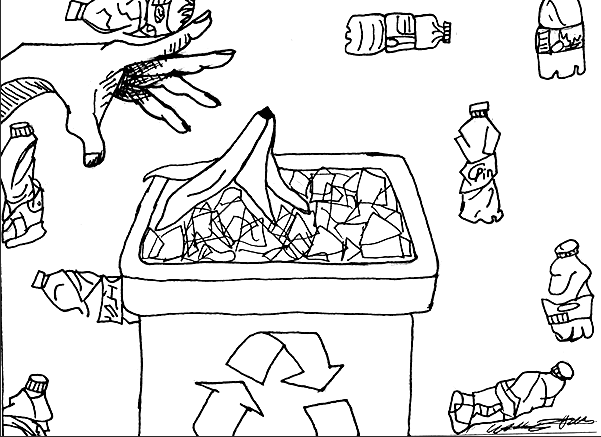South students see need for recycling awareness
March 16, 2019
As senior Sora Heo has begun to better understand the devastating toll pollution has taken around the world, she has noticed the inefficiency of recycling at South. Many of South’s recyclable objects are currently being thrown in the garbage, which renders them unrecyclable, according to junior Tea Logli.
Currently, South uses Waste Management for the school’s recycling needs, according to Tina Wagner, maintenance administrative assistant. Wagner says that Waste Management follows a Single Stream Recycling process, where items are collected daily from the building and picked up by Waste Management three times per week. According to Waste Management’s website, materials cannot be recycled if they are contaminated by food waste.
Heo has noticed a lack of recycling bins in her classrooms, and Logli agrees that she thinks South can do better.
“We’re a huge school with a bunch of kids and many kids probably use paper trays, cups [and] eating utensils on a daily basis,” Logli stated. “If we were to recycle those we would be saving the environment.”
Since there are so many students at South, the actions of individuals who choose not to recycle quickly add up, Logli explained. The increasing amount of wasted recyclable objects is also important to consider for future generations, according to the Auditorium Director Rich Winship, who had previously run a recycling program at South for two years in the early 90s.
“I think [recycling] is important to us beyond the school,” Winship said. “We have to reuse and reduce, but definitely recycle as much as we can. I think we’re in a global situation where the garbage we produce [is a crisis], so it’s important for our survival eventually. ”
In order for South to improve the amount of recycling in the building, students can become more active in the process. Besides putting recycling bins in all the classrooms, which according to Logli would be the best solution, senior Joey Herman states there are many things that South students can do in order to reduce and recycle.
“We can persuade people to use the water fountains and bring refillable water bottles instead of using plastic ones and throwing them away,” Herman said. “We can encourage people not print things [and] use their Chromebook more.”
Two problems that would prevent South from being able to increase recycling would be the cost and toll on the custodial maintenance staff, according to Winship. He explained that the possible negative effects of increased number of recycling bins on the maintenance is important to comprehend before taking action.
“This is a really tough situation for our [custodial maintenance] staff to accomplish and a [financial] cost to the whole district,” Winship said. “It’s a real dichotomy because you want to do these things for the planet but you can’t escape the financial realities.”
However, that is not to say that change is impossible. Winship explained that through faculty efforts to bring awareness to students about the problem and encouragement to take action could serve as a possible solution.
“We need to encourage our students to be aware of it,” Winship said. “We need to set an example to not just throw something away randomly as all of us at one time or another probably do. I think it’s up to us to make our students aware and encourage them.”



